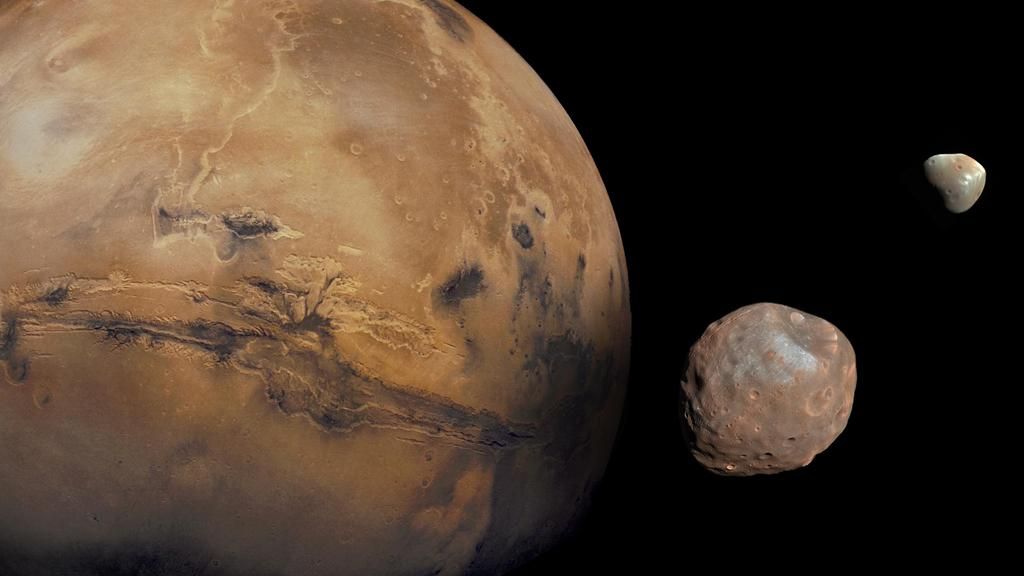
Mars has two tiny moons, Phobos and Deimos, whose names mean "fear" and "terror" in ancient Greek. Maybe "mystery" would have been the better term to choose, since the origins of the two satellites has stumped scientists for decades.
There are two leading theories. One suggests that the moons were tiny asteroids trapped by Mars's gravity. The other argues that they formed after some giant object crashed into the planet and created a bunch of debris, some of which clumped into the two moons. But that giant object may not have been so giant after all, according to new calculations presented in a paper published Wednesday in the journal Science Advances.
That paper argues that the impactor would have been about 30 times smaller than previous estimates—the size of a large asteroid. "This is a very different scale of forming moons from an impact than we've ever considered before because these moons are so tiny," lead author Robin Canup, a planetary scientist at the Southwest Research Institute in Colorado, told Newsweek.
Related: NASA: Scientists studying earthquakes on Mars to learn how planets are formed
Canup and her co-author had a few different constraints to balance as they tried to piece together the crime scene, like the moons' small size and their current distance from Mars. Then they modeled dozens of different collisions, looking for what moons resulted and comparing them to what really orbits Mars.
Those models showed that a truly giant impact didn't work. That size collision would have resulted in very big moons, big enough that they would absorb anything as small as Phobos and Deimos. "You don't actually end up with any little moons out where they are," Canup said of these models.
So she and her colleague started thinking a bit less giant, and that turned out to be the sweet spot for these small moons. The models worked best for an impactor that was between the size of Vesta and twice the size of Ceres—those are two of the largest asteroids in the belt of rocks that falls between Mars and Jupiter.
Canup says that what's most exciting about these smaller impacts is that the new research helps overturn the old belief that moons are hard to make. "Over decades of simulations now we're actually finding the opposite," Canup said. "A huge fraction of those impacts would have produced at least transient moons from their debris."
And that in turn means scientists may have been thinking about moons formed by impacts across the solar system in the wrong way: The weird thing isn't that so many exist but that so few remain. "Instead of this being an unusual event, we think now it should have been commonplace," Canup said. "Moon formation we now think was rampant during planet formation and the early stages of the solar system."
This points to even more intriguing mysteries, she says. After all, Earth's other neighbor Venus has definitely been knocked about a bunch as well—but it has no moons to be found. Fortunately, after tackling Phobos and Deimos, scientists aren't likely to be scared off by more moon mysteries.
Uncommon Knowledge
Newsweek is committed to challenging conventional wisdom and finding connections in the search for common ground.
Newsweek is committed to challenging conventional wisdom and finding connections in the search for common ground.
About the writer
Meghan Bartels is a science journalist based in New York City who covers the science happening on the surface of ... Read more
To read how Newsweek uses AI as a newsroom tool, Click here.








